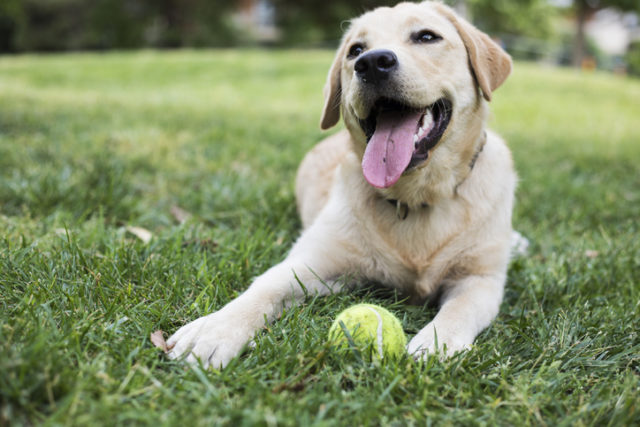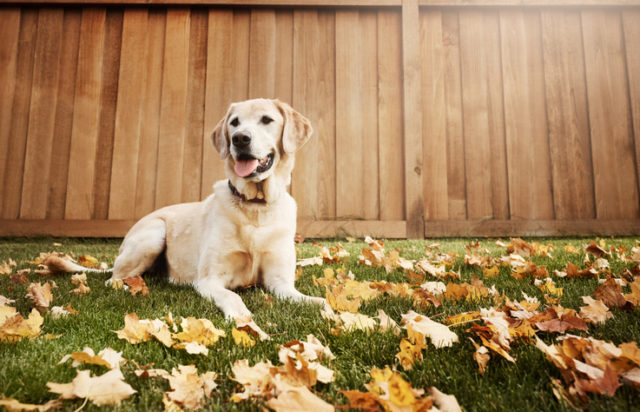When you imagine your ideal dog, do you have a particular breed in mind? While some folks prefer to find a mixed breed that has a dash of this and a splash of that, others have a very clear affinity for a favorite breed. With the AKC referring to them as “friendly, active, and outgoing” it is no surprise that many people only have eyes for Labradors.
Nom Nom, the fresh food partner of iHeartDogs, researched Labradors in terms of common conditions found in Labradors that can be related to food. This information can help you make food choices for your Labrador that lead to a longer, healthier life!

Susceptibility to Allergies
Labradors are genetically more susceptible to allergies than some other breeds. Atopic dermatitis is one of the more common hereditary conditions that Labs inherit.
Canine Atopic Dermatitis in Labradors
Canine Atopic Dermatitis (CAD) is the medical terminology assigned to skin irritations and rashes that result from an allergic reaction. Fleas and environmental allergens like pollen, mold, dust, or fungus can cause allergic reactions in Labs.
Labradors are also at risk for food intolerance. With a food allergy, the skin will often be inflamed, itchy, red, scaly, or bumpy. Chronic allergic reactions and self-trauma can lead to secondary infections, too.
Common Allergy Locations
With Labradors, allergy symptoms can show up anywhere on the body but are frequently found on the face, ears, nuzzle, sides, stomach, nose, and stomach. Symptoms can include dandruff, flaky skin, dry skin, hot spots, hair loss in patches, and sores. This is a very uncomfortable physical condition for your pup to experience.
Food Ingredients that Fight Allergies
If your Labrador is suffering from allergies, you will notice an insatiable need to bite or chew on the affected parts of the body. This sometimes leads to further damage of the skin, which in turn gets greater attention from the irritated dog. Skin allergies can become a terrible cycle as dogs attempt to soothe themselves by licking or chewing but end up causing more harm than good. Thankfully, there are specific ingredients that you can include in your dog’s diet to help reduce inflammation and reduce allergic reaction symptoms.
Chronic Itching and Skin Infection: vitamin E, vitamin B, zinc, fish oil, probiotics
Dull Coat or Scaling: EPA, DHA, zinc
Dandruff or Crusty Skin: zinc, vitamin A

Optimal Diet for Labradors
Labradors are sensitive to food intolerances. This can make it very difficult for families with Labradors to find a commercially produced food that does not induce an allergic reaction in their dog. Labrador Training HQ says,
“Generally speaking, higher quality labrador dog foods should contain less ingredients. If there are a lot of unrecognizable ingredients on the label, they’re most likely low-quality fillers.”
One way to ensure that your Labrador is only eating high-quality, recognizable ingredients is to feed your Lab a fresh food diet. When portioned and planned correctly with the assistance of a qualified expert, fresh food will include essential fatty acids, vitamins, and minerals and that will keep your Labrador’s coat and skin healthy. A strong immune system supports fewer flare-ups. Limited, whole ingredients found in fresh food for dogs lower your Labrador’s exposure to food allergens in his diet so symptoms can be entirely eliminated over time.
About Nom Nom
Your Labrador would benefit from the perfectly portioned fresh food recipes that Nom Nom creates. They are made with restaurant quality ingredients and are chock full of the purity and quality your Labrador needs to stay healthy and allergy-free.
On top of that, every serving of their food includes the Nom Nom Nutrient Mix, which is an extra burst of vitamins and minerals that give your Labrador the balanced nutrition needed to maintain skin and coat health.
Take advantage of a 50% discount being offered to the iHeartDogs community.
 Toledo, United States.
Toledo, United States.
